#Roshi Kapleau
Text
Like sound imprisoned in a record or tape, needing electrical energy and certain devices to reproduce it, so the Heart-mind of the Buddha, entombed in the sutras, needs a living force in the person of an enlightened roshi to re-create it.
— The Three Pillars of Zen by Philip Kapleau
6 notes
·
View notes
Text

Zazen (zen meditation) does not bestow Buddhahood; it uncovers a Buddha nature which has always existed.
~Kapleau Roshi
🎨: Sharmon Davidson, Butterfly Buddha child
24 notes
·
View notes
Note
What exactly the meaning 0f "zen"?
Zen, above all, means sitting meditation. Zen is a form of Buddhist practice centered on sitting meditation. Zazen means to sit meditation in Japanese, and zen is short for zazen. In China, where zen lineages began, it is called Chan. In Korea, Seun. Zen became popular in the west when influential teachers from Japan started teaching in America. The Japanese term for zen became popular in the 60's and 70's with books like Zen Mind Beginner's Mind by Suzuki Roshi, Three Pillars of Zen by Roshi Phillip Kapleau and Zen and the Art of Motorcycle Maintenance by Robert Pirsig.
Zen as a word is used to describe a calm state of mind, or a moment of vivid presence.
1 note
·
View note
Photo










#Hon ‘Ami Koetsu#john daido loori#James ford#Roshi Kapleau#Teshin Matthew Sweger#north carolina zen center#Stephen Gaskin
1 note
·
View note
Text

* * * *
Zen Master Dogen has pointed out that anxiety, when accepted, is the driving force to enlightenment in that it lays bare the human dilemma at the same time that it ignites our desire to break out of it.
— Roshi Philip Kapleau (1912 - 2004), American Zen Master
[Thanks to Alive On All Channels]
39 notes
·
View notes
Text
and the mind must be taut as you concentrate on the counting
At the same time continue to count inhalations and exhalations as you walk slowly around the room. Begin walking with the left foot and walk in such a way that the foot sinks into the floor, first the heel and then the toes. Walk calmly and steadily, with poise and dignity. The walking must not be done absentmindedly, and the mind must be taut as you concentrate on the counting.
—By Roshi P. Kapleau, from ”Instructions on Walking Meditation” in The Three Pillars of Zen (Knopf Doubleday Publishing Group, Dec 18, 2013)
1 note
·
View note
Quote
Zen Master Dogen has pointed out that anxiety, when accepted, is the driving force to enlightenment in that it lays bare the human dilemma at the same time that it ignites our desire to break out of it.
Roshi Philip Kapleau (1912 - 2004), American Zen Master (with thanks to aliveonallchannels)
1 note
·
View note
Quote
We understand the specific attraction of Zen when we realize the extent to which the contemporary West is animated by ‘prophetic faith,’ the sense of the holiness of the ought, the pull of the way things could be and should be but as yet are not. Such faith has obvious virtues, but unless it is balanced by a companion sense of the holiness of the is, it becomes top-heavy. If one’s eyes are always on tomorrows, todays slip by unperceived. To a West which in its concern to refashion heaven and earth is in danger of letting the presentness of life — the only life we really have — slip through its fingers, Zen comes as a reminder that if we do not learn to perceive the mystery and beauty of our present life, our present hour, we shall not perceive the worth of any life, of any hour... Zen tells us that the is is holy and the Void is home, but such affirmations are not Zen. Rather, Zen is a method for attaining to the direct experience of the truth of these affirmations.
Roshi P. Kapleau, from The Three Pillars of Zen
#roshi p. kapleau#quote#quotation#zen#time#what is time even#mindfulness#future#holiness#mystery#christian mysticism#meditation#thankfulness#void#boundlessness
2 notes
·
View notes
Text
There is a line a famous Zen master wrote at the time he became enlightened which reads: “When I heard the temple bell ring, suddenly there was no bell and no I, just sound.” In other words, he no longer was aware of a distinction between himself, the bell, the sound, and the universe. This is the state you have to reach. Don’t relax—strive on!
-- Roshi P. Kapleau, The Three Pillars of Zen
21 notes
·
View notes
Text
Bibliography
All the Buddhist books I have taken notes from, with links if they are available free online. Updated 02/26/24.
After the Ecstasy, the Laundry: How the Heart Grows Wise on the Spiritual Path by Jack Kornfield
Awakening the Buddha Within: Eight Steps to Enlightenment: Tibetan Wisdom for the Western World by Lama Surya Das
Buddha's Brain: the Practical Neuroscience of Happiness, Love & Wisdom by Rick Hanson, Ph.D., and Richard Mendius, M.D.
Buddhish: A Guide to the 20 Most Important Buddhist Ideas For the Curious and Skeptical by C. Pierce Salguero
Buddhism Without Beliefs: A Contemporary Guide to Awakening by Stephen Batchelor
Dhammapada: The Sayings of the Buddha translated by Thomas Byrom, Shambhala Pocket Classics 1993 (There are A LOT of versions of this online, but not this particular edition)
Enlightenment is an accident: ancient wisdom and simple practices to make you accident prone by Tim Burkett
Happiness is Overrated: Simple Lessons on Finding Meaning in Each Moment by Cuong Lu
How to Raise an Ox: Zen practice as taught in Zen master Dogen's Shobogenzo by Francis Dojun Cook (2002)
How We Live is How We Die by Pema Chödrön
Illumination: a guide to the Buddhist method of no-method by Rebecca Li
Love for Imperfect Things by Haemin Sunim
"Living my vow," by Zenju Earthlyn Manuel in Lion's Roar, March 2021.
Nothing Holy About It: The Zen of Being Just Who You Are by Tim Burkett
Novice to Master: An Ongoing Lesson in the Extent of My Own Stupidity by Soto Morinaga
Opening to Oneness: A Practical & Philosophical Guide to the Zen Precepts by Nancy Mujo Baker
The Other Shore by Thich Nhat Hanh
Shambhala: The Sacred Path of the Warrior by Chögyam Trungpa
A Spiritual Renegade's Guide to the Good Life by Lama Marut
Start Here Now: An Open-Hearted Guide to the Path and Practice of Meditation by Susan Piver
The Things You Can See Only When You Slow Down by Haemin Sunim
The Three Pillars of Zen: Teaching, Practice, and Enlightenment by Roshi Philip Kapleau (I read the 25th anniversary edition and this is the 1967 version)
Wake Up: How to Practice Zen Buddhism by Bonnie Myotai Treace
Walking the Way: 81 Zen Encounters with the Tao Te Ching by Robert Meikyo Rosenbaum
The Way of the Bodhisattva by Shantideva, revised translation and new preface by the Padmakara Translation Group (2006) (This is another one that is widely available online in other editions.)
When Things Don't Go Your Way: Zen Wisdom for Difficult Times by Haemin Sunim
Zen and the Art of Anything by Hal W. French
Zen Beyond Mindfulness: Using Buddhist and Modern Psychology for Transformational Practice by Jules Shuzen Harris
Zen Flesh, Zen Bones by Paul Reps
Zen Mind, Beginner’s Mind by Shunryu Suzuki (Link goes to a book that is listed as the 2006 ed but it looks identical to my 2002 edition)
61 notes
·
View notes
Text

“Reading about enlightenment is like scratching an itch through your shoe”. —Roshi Kapleau
#buddhism#literature#zen#spirituality#philosophy#writing#inspiring quotes#inspirational quotes#quotes#self help#enlightenment#reading#books#eastern
28 notes
·
View notes
Photo
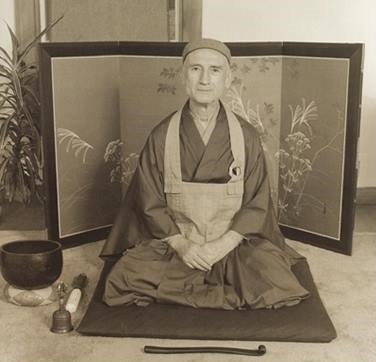
***ACTITUD FRENTE AL DOLOR***
"El dolor puede ser el mejor maestro de la vida. Algunos dolores son tan lacerantes que nuestro sentido de separación, nuestra idea de quiénes somos, los apegos a toda clase de cosas, desaparecen en un primordial fuego de dolor, nada más existe. Durante aquel momento eterno, ocurre algo imperceptible, y cuando el dolor se retira o desaparece, ya no somos los mismos. Esto sólo es posible si no existe ninguna separación entre uno mismo y el dolor : si uno no lucha contra él, ni se resiste, ni lo odia..."Roshi Philip Kapleau, El zen de la vida y la muerte
2 notes
·
View notes
Quote
For the ordinary [untrained] human being, whose mind is a checker-board of criss-crossing reflections, opinions, and prejudices, bare attention is virtually impossible.
Roshi Philip Kapleau
8 notes
·
View notes
Text
Buddhism Resources

by Saṃsāran
Buddhism is a practice as I have said many times before. It is not a religion in the traditional Western sense of the word. However, there is much to learn from the Suttas i.e. the teachings of the Buddha himself as well as from the many commentators on the teachings.
Here are some links to online books you might find useful in your studies:
Suzuki: Zen Mind, Beginner’s Mind
Santina: The Fundamentals of Buddhism
The Udana: The Utterances of Siddhartha Gautama
Blackwell: Companion to Buddhist Philosophy
Batchelor: Buddhism Without Beliefs
Narada: Buddhism in a Nutshell
Rahula: What the Buddha Taught
The Dhammapada: The Collected Sayings of the Buddha The Word of the Buddha
Roshi Kapleau: The Three Pillars of Zen
Watts: The Way of Zen
If you are interested in course work in Buddhism may I suggest Buddhist Studies at Buddhanet which is also free.
If you are interested in joining a sangha (Buddhist community) please see the World Buddhist Directory for one near you.
May I make one note here for Americans. America is diverse with many Buddhist communities. Most of these were founded by and for East Asian immigrants and can still have a very “Eastern” flavor. This is an attraction for some non-ethnically Asian people and a turn off for others. Some communities of religious Buddhists can seem very superstitious and ritualistic and unlike the more secular Buddhism which has become popular in the West. So, if one community does not appeal to you try another.
48 notes
·
View notes
Photo
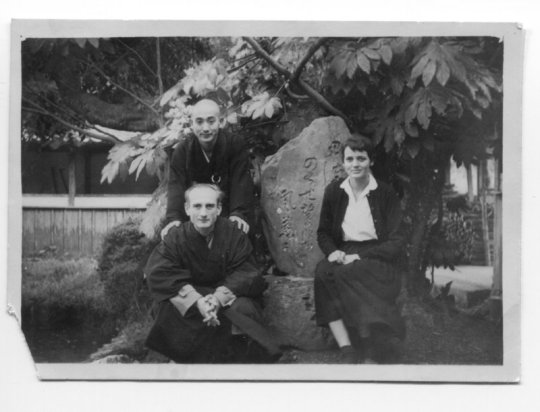
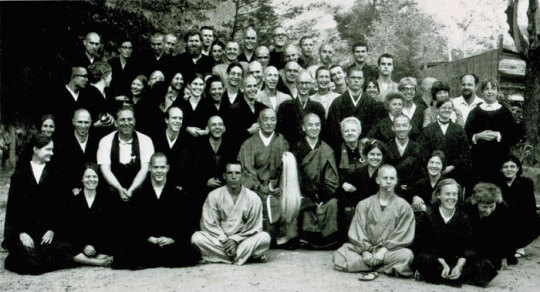
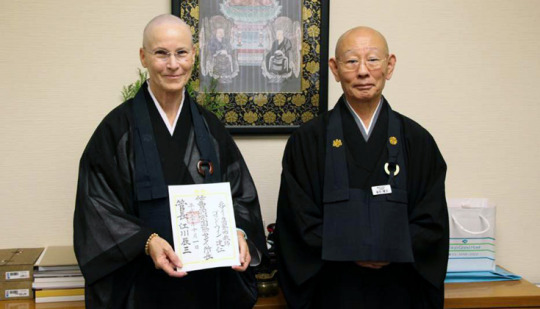
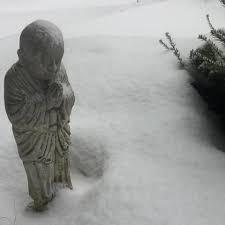
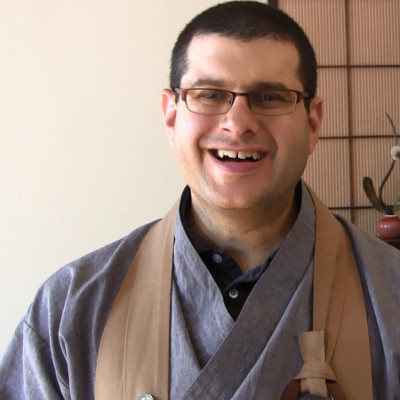
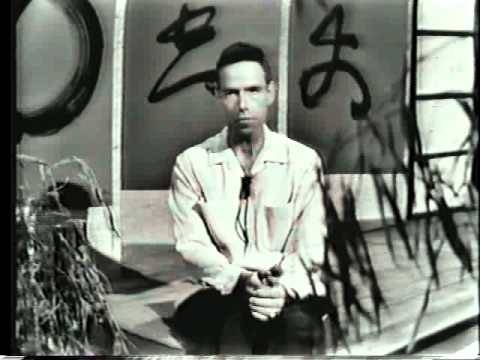

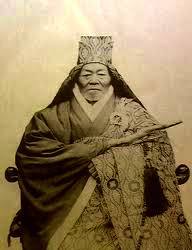
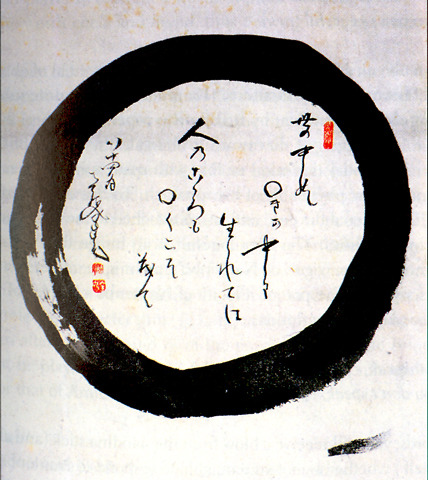
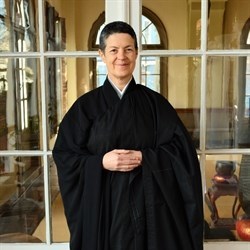
#b.white#Roshi Kapleau#Tangen-roshi#Gaelyn Godwin#konjin#Josh Jiun Bartok#Tatsugami Rosh#Joanna Bull#alan watts#reb anderson#Nakahara Nantenbō
0 notes
Text
Zen Master Dogen has pointed out that anxiety, when accepted, is the driving force to enlightenment in that it lays bare the human dilemma at the same time that it ignites our desire to break out of it.
— Roshi Philip Kapleau (1912 - 2004), American Zen Master
[Thanks to Alive On All Channels]
8 notes
·
View notes